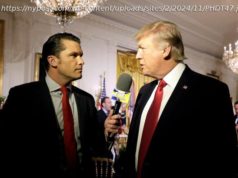For people who have done business with the president, the protracted fight over the government shutdown reflects a time-tested playbook.
Three decades ago, Donald J. Trump waged a public battle with the talk show host Merv Griffin to take control of what would become Mr. Trump’s third Atlantic City casino. Executives at Mr. Trump’s company warned that the casino would siphon revenue from the others. Analysts predicted the associated debt would crush him.
The naysayers would be proved right, but throughout the turmoil Mr. Trump fixated on just one outcome: declaring himself a winner and Mr. Griffin a loser.
As president, Mr. Trump has displayed a similar fixation in his standoff with Congress over leveraging a government shutdown to gain funding for a wall on the Mexican border. As he did during decades in business, Mr. Trump has insulted adversaries, undermined his aides, repeatedly changed course, extolled his primacy as a negotiator and induced chaos.
“He hasn’t changed at all,” said Jack O’Donnell, who ran a casino for Mr. Trump in the 1980s and wrote a book about it. “And it’s only people who have been around him through the years who realize that.”
Mr. Trump briefly seemed to follow a more conventional approach for a president seeking consensus: encouraging his party leaders in Congress to negotiate a deal. Senator Mitch McConnell of Kentucky, the Republican majority leader, shepherded a compromise in December that would have kept the government open and put off negotiations over a wall and other border security measures.
Mr. Trump was expected to sign off on the deal, but then came the suggestion from conservative critics that he had caved in to Democrats — that he was a loser. It was a perception Mr. Trump could not bear, and he quickly reversed course.
He also reverted to lifelong patterns in business. People who worked with him during those years say they see multiple parallels between Mr. Trump the businessman and Mr. Trump the steward of the country’s longest government shutdown.
His lack of public empathy for unpaid federal workers echoes his treatment of some construction workers, contractors and lawyers whom he refused to pay for their work on his real estate projects. The plight of the farmers and small-business owners wilting without the financial support pledged by his administration harks back to the multiple lenders and investors who financed Mr. Trump’s business ventures only to come up shortchanged.
And his ever-changing positions (I’ll own the shutdown; you own the shutdown; the wall could be steel; it must be concrete; then again, it could be steel) have left heads in both parties spinning. Even after his televised proposal on Saturday to break the deadlock, Mr. Trump has no progress to show.
“I think he was always a terrible negotiator,” said Tony Schwartz, co-author with Mr. Trump of “The Art of The Deal.”
That book, published in 1987, was intended to be an autobiography of Mr. Trump, who was 41 at the time. Mr. Schwartz said that he created the idea of Mr. Trump as a great deal maker as a literary device to give the book a unifying theme. He said he came to regret the contribution as he watched Mr. Trump seize on the label to sell himself as something he was not — a solver of complicated problems.
Rather, Mr. Schwartz said, Mr. Trump’s “virtue” in negotiating was his relentlessness and lack of concern for anything but claiming victory.
“If you don’t care what the collateral damage you create is, then you have a potential advantage,” he said. “He used a hammer, deceit, relentlessness and an absence of conscience as a formula for getting what he wanted.”
In a brief telephone interview on Sunday, Mr. Trump was not specific in defending his tactics, but he described himself as successful in his chosen fields of real estate, entertainment and finally politics. “I ran for office once and I won,” Mr. Trump said.
The president’s supporters say he gets an unfair rap as a poor negotiator, saying that his style and unusual approach — and unwillingness to accept defeat even in the worst situations — have often had positive results.






